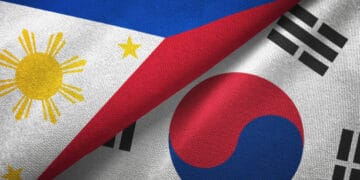The recent signing of a free trade agreement (FTA) between the Philippines and South Korea marks a significant step forward in their diplomatic relations. Formalized during the 43rd ASEAN Summit in Jakarta, Indonesia, this agreement is poised to bolster economic ties and promote closer cooperation between the two nations.
Signed on the sidelines of the 43rd Association of Southeast Asian Nations (ASEAN) Summit, the FTA signifies a deepening of relations between the Philippines and South Korea. Both Philippine President Ferdinand Marcos Jr. and South Korean President Yoon Suk-yeol were present during the signing ceremony, underscoring the importance of this milestone agreement.
The Philippines and South Korea share a longstanding history of diplomatic ties dating back to the 1960s. Over the years, their relationship has flourished, marked by cultural exchanges, robust tourism, and growing economic collaboration. South Korea has consistently ranked among the Philippines’ top trading partners and a significant source of foreign direct investment.
Key Provisions of the FTA: Under the FTA, both countries have committed to significant tariff concessions. South Korea will eliminate tariffs on approximately 94.8 percent of Philippine products, while the Philippines will reciprocate by abolishing tariffs on about 96.5 percent of South Korean products.
The agreement covers a wide range of provisions, including trade in goods, trade remedies, rules of origin, customs procedures, trade facilitation, economic and technical cooperation, competition, and legal and institutional matters.
For the Philippines, priorities within the FTA include enhancing market access for key products such as bananas, processed pineapples, various fruits, industrial goods, and services. Notably, bananas had been excluded from previous agreements, making them a focal point in negotiations with South Korea.
For South Korea, the elimination of tariffs on automotive units and components is a significant win. This opens opportunities for South Korea’s auto industry to expand its presence in the Philippines, which historically had limited engagement in this sector.
Expected Impact on the Private Sector: The FTA between the Philippines and South Korea holds great significance for both nations’ private sectors, with several industries poised for growth:
Automotive Industry: With tariffs removed on auto units and parts, South Korea’s auto industry gains a competitive edge in the Philippines, presenting opportunities for expansion and economic growth. Agricultural Sector: Improved market access for agricultural products benefits Filipino producers, leading to increased exports and competitiveness in South Korea. Information Technology (IT) and Electronics: Reduced trade barriers create favorable conditions for South Korean companies to explore opportunities in the Philippines, potentially leading to increased investments and technological exchange. Services Industry: Enhanced cooperation in services can result in greater access for service providers in both countries, spanning finance, telecommunications, and professional services. Emerging Sectors: Cooperation in smart farms and electric vehicles (EVs) opens avenues for joint ventures, technology transfers, and investment opportunities, fostering innovation and growth. Conclusion: The Philippines-South Korea FTA sets the stage for deeper trade collaboration, benefiting businesses and investors in both countries. Beyond economic advantages, the agreement underscores shared commitments to frontier technology and the green economy, paving the way for a prosperous future.
Stay updated with supply chain news at The Supply Chain Report. Learn more about international trade at ADAMftd.com with free tools.
#PhilippinesSouthKoreaFTA #FreeTradeAgreement #Philippines #SouthKorea #ASEANSummit43 #EconomicPartnership #GlobalTrade #TradeRelations #AutomotiveIndustry #BananaExports #AgriTrade #TechInnovation #SmartFarming #ElectricVehicles #TradeOpportunities #MarketAccess #CustomsProcedures #BilateralTrade #EconomicGrowth #RegionalCooperation #TariffElimination #InvestmentOpportunities #SoutheastAsia #PhilippineExports #SouthKoreaTrade #ASEANTrade














